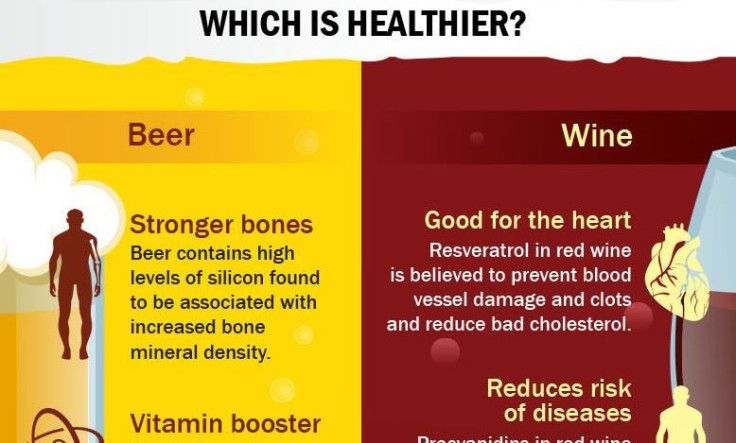Battle Of The Booze: Is Fine Wine Over Good Beer Really A Healthy Choice?

In life, we are told there are two kinds of people: wine drinkers and beer drinkers. America’s thirst for these two popular alcoholic drinks brings back the age-old debate of beer versus wine. The common belief is a glass of fine wine is healthy, but is it healthier than a foamy, cold glass of beer?
Sip (or guzzle down) these facts about wine and beer to decide which one offers the most life-extending benefits.
Fine Wine: Is It Really So Divine?
Health experts have long lauded wine for its numerous health benefits, specifically its antioxidants, which reduce risk for coronary heart disease. About 200 years ago, an Irish doctor noted chest pain (angina) was far less common in France than in Ireland, according to the Harvard School of Public Health. He attributed this stark distinction to “the French habits and mode of living.” Although the French diet includes plenty of butter and cheese, the country has one of the lowest rates of heart disease in the world, and the French's high consumption of red wine may be why.
Fine Wine: Heart And Brain Healthy
A study published in the journal Lancet found there was a strong and negative association between ischemic heart disease deaths and alcohol consumption. The findings revealed there is a positive but inconsistent association with cardiac mortality and saturated and monounsaturated fat intake. The correlation seen between less cardiac deaths and alcohol was attributed to wine consumption.
Resveratrol, an antioxidant found in wine, along with the antioxidant compound quercetin, have been shown to benefit the brain. A 2013 study published in the journal Bio Medical Central Medicine found drinking wine could lower the risk for depression. Since resveratrol and quercetin can suppress high levels of C-reactive protein (CRP) — associated with the likelihood of displaying depressive symptoms — it can actually lessen psychological distress associated with depression.
Fine Wine: Which Wine Has The Most Antioxidants?
Wine’s cardioprotective effect has been linked to the antioxidants present in the skin and seeds of red grapes. These antioxidants, such as flavonoids, may help prevent heart disease by increasing levels of good cholesterol, known as high-density lipoprotein (HDL), and protecting against artery damage, says the Mayo Clinic. Researchers at the University of California, Davis, found Cabernet Sauvignon, Petit Syrah and Pinot Noir, are among the wines with the highest concentrations of flavonoids. White wine was found to have significantly smaller amounts than its red counterparts. A rule of thumb is the dryer the red wine, the better it is for a flavonoid boost.
Good Beer: Is It Better?
The majority of medical literature suggests drinking a glass of red wine is drinking to your health, but can a pint of beer do just the same? Similar to its popular counterpart, beer contains antioxidants and important B vitamins, like niacin and folic acid. A single 12-ounce bottle of beer provides up to 12.5 percent of the recommended requirement of vitamin B6, which is known to help cells and be heart healthy, according to eatright.org, part of the Academy of Nutrition and Dietetics.
Good Beer: Bone And Kidney Healthy
Guzzling a pint or two of beer in a matter of seconds may not only turn you into “beercules,” but it can also give you strong bones. Silicon, which is commonly found in whole grains, cereals, and some vegetables, is known to improve bone matrix quality. A 2013 study published in the International Journal of Endocrinology noted silicone supplementation in animals and humans has been shown to increase bone mineral density and improve bone strength. However, while drinking moderate amounts of alcohol (wine as well as beer) is related to greater bone density in men and women over 60, they also found bone mineral density was significantly lower in men who drank more than two servings of liquor per day.
Drinking beer can give you good bone health and reduce the risk of developing painful kidney stones by 41 percent. A 2013 study published in the Clinical Journal of the American Society of Nephrology found beer’s anti-kidney stone properties could possibly be due to beer’s high water content and diuretic effect. Soda and punch was found to increase the risk of developing kidney stones as predicted by the researchers.
Beer vs. Wine: Which Is Healthier?
Wine and beer both provide life-extending benefits, respectively, but neither is healthier than the other. It’s not the beverage of choice but rather the frequency of drinking that may matter when reaping alcohol’s benefits. A 2010 study published in the journal Alcoholism: Clinical and Experimental Research found during a 20-year period, those who didn’t drink alcohol suffered from the highest mortality rates at 59 percent, moderate alcohol drinkers who consumed little or no wine at 50 percent rate, and moderate drinkers who consumed mostly wine had a 32 percent mortality rate. Although this study may confirm wine’s health powers, the researchers delved a bit deeper and found that is not the case.
The UT team found wine offered no greater health benefit than beer or liquor after adjusting for lifestyle factors. The truth is any type of alcohol can offer life-extending benefits. Regular, moderate drinking can increase your longevity and improve your overall health in various ways.
So whether you’re a wine or beer drinker, you’ll still reap the benefits of alcohol. Cheers!
Check out CompareCamp.com’s beer vs. wine infographic below for interesting facts and figures about these two alcoholic drinks.

Created by: comparecamp.com Author: Emily Bead Join our: FriendFeed
Published by Medicaldaily.com



























